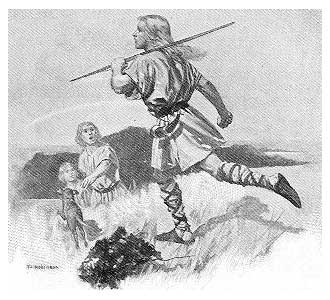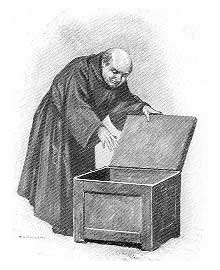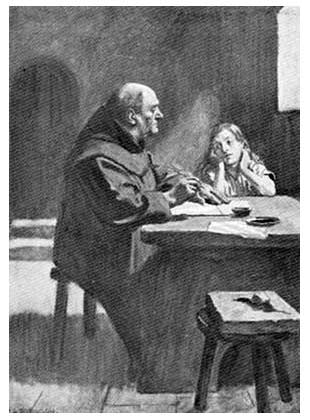Chapter 5 | Beginning To Be Great | The King's Sons
The boys had some fresh plan for the next day, and when Alfred went up to bed they were all whispering eagerly; but as soon as their brother entered the room they pretended to be asleep.
Alfred said nothing till he was undressed and about to get into his bed, and then he only wished them good night.
There was no reply, and the boy felt hurt; but just then he recollected something which made him clap his right hand first to his cheek and then to his forehead, as if he fully expected to find both places still wet and warm. They felt still as if his mother’s lips had but just left them.
From that moment Alfred lay quite still in the darkness, feeling very happy and contented, till all at once a long-drawn restful sigh escaped his lips, and he was just dropping off to sleep when he awoke again and lay listening, for his three brothers, believing that he had gone off to sleep, began talking again in an eager whisper, but what about he could not tell, till all at once Red said something about “otters.”
They were going to have a grand otter hunt up the little Wantage stream with the dogs; and for a few moments a feeling of bitter disappointment came over the boy, for he had looked forward to the day when that hunt would take place.
He felt better when he recalled the Queen’s words as he wished her good night. They were:
“I am so glad, Fred, my boy. You have made me feel very happy.”
“Father Swythe must have told her what I said,” thought Alfred, and in another minute he was asleep.
The next morning after breakfast the boy did not feel half so brave, and he was thinking of how he could get away to the monk’s quiet cell-like room without his brothers seeing him; but he was spared from all trouble in that way, for the monk came up to him smiling.
“I’m going to speak to your brothers, Fred,” he said. “I told the Queen that you had promised to try very hard, and she said she was very glad, but she would be so much happier if your brothers came too; so I am going to ask them to come. Do you know where they are?”
“Out in the broad courtyard,” said Alfred quickly; but Father Swythe shook his head.
“No,” he said; “I came across just now, and they were not there.”
At that moment the distant barking of a dog was heard; followed by a yelping chorus which made the boy run to the window and look out, to catch sight of three figures and some half-dozen dogs disappearing over the hill slope.
“I think they have gone after the otters with the dogs,” said Alfred sadly.
“Oh, I see,” said the monk; “and you feel dull because you are not with them?”
Alfred was too honest to deny it.
“Never mind, boy,” said the little monk cheerily; “come to my room, and we’ll finish making the ink, and then you can learn to read the letters as I make them, while I write out a poem for the Queen; and then I’ll get out the red and blue and yellow, and the thin leaves of gold, and we’ll try and make a beautiful big letter like those in the Queen’s book, and finish it off with some gold.”
“But you can’t do that?” cried Alfred, interested at once.
“Perhaps not so well as in the Queen’s beautiful book; but come and see.”
The boy eagerly took hold of the monk’s hand, and they were soon seated at the little table in Swythe’s room, with the light shining full upon the slate slab, the pebble grinder, and the black patch.

“You said that was ink yesterday,” said the boy, as Swythe gave the pebble a few turns round, and then looked to see if the ink was of the right thickness, which it was not, so a feather was dipped in a water-jug, and a few drops allowed to fall upon the black patch.
“There,” said Swythe, “a good writer makes all his own ink. Now you grind that up till it is well mixed. Gently,” cried Swythe; “that ink is too precious to be spread all over the slab. Grind it round and round. That’s the way! That will do!”
As he spoke, Swythe took a thin-bladed knife and a good-sized, nicely-cleaned fresh-water mussel-shell, and let the boy carefully scrape up all the ink from the slab and place it in the shell.
“That’s well done!” he said. “Now we’ll write a line of letters.”
“Yes,” cried the boy; “let me write them.”
“I wish you could, Fred, my boy,” said the monk, smiling; “but you must first learn.”
“That’s what I want to do,” cried the boy eagerly. “But how am I to learn?”
“By watching me. Now see.”
Swythe rose from the table and opened a box, out of which he took a crisp clean piece of nearly transparent sheepskin and a couple of quill pens, sat down again, and then from another box he drew out a piece of lead and a flat ruler—not a lead-pencil such as is now used, but a little pointed piece of ordinary lead—with which he deftly made a few straight lines across the parchment, and then very carefully drew a beautiful capital A, which he finished off with scrolls and turns and tiny vine-leaves with a running stalk and half-a-dozen tendrils.
“But you have put no grapes,” cried Alfred.
“Give me time,” said Swythe good-humouredly, and directly after he faintly sketched in a bunch of grapes, broad at the top and growing narrower till it ended in one grape alone.
“Oh, I wish I could do that!” cried Alfred eagerly. “But I could never do it so well!”
“I’m going to persevere till I make you do it better,” said Swythe. “Now we’ll leave that for a bit and begin a Latin lesson.”
Alfred sighed and looked longingly at the faint initial letter.

But his interest was taken up directly, for Swythe took up one of his quill pens, examined it, and then, after giving the ink a stir, dipped in his pen and tried it.
The next minute, while the boy sat resting his chin upon his hands, it seemed as if beautifully-formed tiny letters kept on growing out of the pen, running off at the point, and standing one after another in a row, almost exactly the same size, till four words stood out clearly upon the cream-coloured parchment.
As he formed the letters with his clever white fingers, Swythe repeated the name of each, pausing a little to give finish and effect as well as sound to the words he formed, till he had, after beginning some little distance in, made so many words upon one of the faintly-drawn lines and reaching right across the parchment.
“It’s wonderful!” cried Alfred. “I could never do that!”
“It is not wonderful, and you soon will be able to do it,” said Swythe; “but let’s say all those words over again letter by letter, and then the words.”
“They are Latin?” asked the boy.
“Yes,” said Swythe, “and you are going to learn them so as to know them next time you see them.”

Alfred shook his head, but he managed to repeat the Latin words straightforward, and after a while pick them out when asked. Then the monk proceeded to get out his colours so as to ornament the big initial letter of what Alfred had learned in Latin as well as in English was “The History of the Good King Almon.”
Then came the most interesting part of the lesson, for, after Swythe had placed his colours ready—red, yellow, and blue—all in powders ground up so fine that it was necessary to shut out the breeze which came in at the window, Alfred learned how the monk made his brushes, by taking a tuft of badger’s hair and tying up one end carefully with a very fine thread of flax.
“Now watch me,” said the old man, and Alfred looked closely while Swythe took a duck’s quill out of a bunch, cut off the hollow part, and then lightly cut off the end where it had grown from the duck’s wing. Then the tuft of badger’s hair was held by its tied end and passed through the monk’s lips so as to bring the hairs together to a point, which was carefully pushed into the most open part of the quill and screwed round till the whole of the tuft was inside. Then a thrust with a thin piece of wood sent the hairs right through, all but the tied-up ends; and Swythe held his work up in triumph—a complete little paint-brush.
“How clever!” cried the boy eagerly; “but how did you get that badger’s hair?”
“Saved,” said Swythe, “when the dogs killed that badger last year.”
“And the ducks’ quills?”
“I picked them up when the ducks were plucked by the scullion.”
“You did not tell me how you made that black paint.”
“By holding a piece of slate over the burning wick of the lamp till there was plenty of soot to be scraped off and mixed up with gum water made from plum-tree gum, the same as I am going to use to mix up these colours, you see.”
As he spoke Swythe took a clean mussel-shell and placed in it a tiny portion of scarlet powder.
“That’s a pretty colour!” said the boy. “What is it?”
“The colour made by burning some quicksilver and brimstone together in a very hot fire till it is red, and afterwards I grind it up into fine dust. Now,” he said, “I’m going to mix this up with gum; and then we’ll paint all the back of the parchment behind the big letter red.”
Alfred watched the monk’s clever touches with the point of his little brush till there was a great square patch upon which the letter seemed to stand.
“Beautiful!” cried Alfred. “Now it’s done!”
“Oh, no,” said Swythe; “that’s the beginning! Now we’ll paint the scroll.”
“Why do you say we” said the boy. “It is you.”
“It’s we, because you are helping me,” said the monk. “Very soon you will be doing letters like this, and then I shall help you.”
Alfred sighed.
“Are you going to paint that scroll red too?”
“No: purple,” was the reply, and Swythe took up another little packet, which he opened slowly.
“Why, that’s blue,” cried Alfred.
“Wait a moment!” said Swythe, taking up another clean mussel-shell, into which he put a tiny patch of the bright blue dust. “Now you shall see it turn purple.”
Taking up the brush, whose hairs were thickly covered with red paint, he poured a few drops of gum water into the shell amongst the blue powder, mixed all together with the red brush, and to the boy’s great delight a beautiful purple was the result.
Then the leaves that had been sketched in had to be done, and while the boy wondered another shell was taken, the brush carefully washed, and a little of the blue dust was mixed with some yellow, when there was a brilliant green, which the monk made brighter or darker by adding more yellow or more blue.
The big ornamental letter was now becoming very bright and gay, Alfred looking upon it as finished; but Swythe went on.
“It’s very wonderful!” said the boy. “You seem as if you can make any colours out of red, yellow, and blue.”
“So will you soon!” said Swythe, smiling, and still painting away, till at the end of a couple of hours, which seemed to have passed away like magic, the monk began to carefully clean his brush with water.
“That’s done now!” cried Alfred, with a sigh of as much sorrow as pleasure, for he felt it to be a pity that the task was finished. “But do you know, Father Swythe,” he continued, as he held his head on one side and looked critically at the staring white letter with its beautiful ornamentation, “I think if I could paint and painted that letter I shouldn’t have left it all white like that.”
“What would you have done, then?”
“I should have painted it deep yellow like a buttercup—a good sunny yellow, to look like gold.”
“Well done!” cried the monk. “Why, that’s exactly what it is going to be. It isn’t finished, but I’m not going to paint it yellow. I’m going to paint it red first.”
“I don’t think I shall like that,” said the boy, shaking his head.
“Wait and see!” said the monk, and once more mixing up a little red with gum he carefully painted the white letter scarlet, and held it up.
“There!” cried the boy triumphantly; “it looks now almost like the back patch, and you’ve spoiled it all.”
“Umph!” grunted the monk, re-opening the window and laying his work in the sun to dry. “Wait a bit.”
“Yes, I’ll wait,” said the boy, watching the shiny wet paint turn more and more dull; “but I don’t like it.”
Swythe washed his brush carefully again, and as soon as the paint was dry went carefully over the letter part with gum, so delicately that the red colour was not disturbed nor the background smeared.
“Yes,” said the boy, still watching; “that looks a little better, because it looks shiny, but it was better white. Do paint it yellow now.”
“I told you I’m going to make it yellow,” said Swythe, laying his work well out in the sunshine to get thoroughly dry.
Then, taking it from the window-sill and shutting out the breeze again, Swythe placed his work ready and took out, from a snug corner, a tiny book made by sewing together about half-a-dozen leaves of parchment, and upon opening this very carefully Alfred saw within a piece of brilliant shining gold.
“Oh, how beautiful!” cried Alfred, making a dart at it with his hand. But, as if he expected this, Swythe put out his own hand and caught his pupil’s just in time, creating such a breeze, though, that the very thin gold leaf rose up at the corner and fell over, doubling nearly in half.
“There, you see how fine it is!” cried Swythe.
“I’m very sorry—I did not know,” said the boy sadly; and then he looked on in wonder, for the monk bent down, gave a gentle puff with his breath, and the gold was blown up, to fall back into its place.
“Why, I thought it would be quite hard and heavy,” said Alfred.
“And it’s twenty times as thin as the parchment!” said Swythe. “Now then, suppose we make the letter of gold.”
Alfred did not speak, but watched with breathless interest while the monk took his knife and carefully cut a long strip off one edge of the gold leaf, and then, dividing it in four, took it up bit by bit on the blade, and laid the pieces along the letter, cutting off edges and scraps that were not wanted, and covering up bare places so carefully and with such great pains that at last there was not a trace left of the gummed letter, a rough, rugged gold one being left in its place.
“There!” cried Swythe, when he had covered the last speck, and all was gold leaf; but Alfred shook his head.
“It looks very beautiful,” he said; “but I don’t like it. The edges are all rugged and rough.”
“So they are!” replied Swythe, and, taking now a clean dry brush, he began to smoothe and dab and press gently till there was not a trace left of where the scraps of gold joined or lay one over the other, all becoming strong and perfect excepting the edges, where the gold lay loose, till, quite satisfied with his work, the monk passed his brush briskly over the letter, carrying off every scrap of gold outside the gummed letter, and leaving this clean, smooth, and glistening.
“Oh, Father Swythe,” cried Alfred, clapping his hands, “you are clever! It’s beautiful!”
“You like it, then, my boy?” said the old man gravely. “You shall soon be able to do that with your light fingers.”
The boy looked down at his hands and then took up the pen the monk had laid down, dipped it in the ink, and tried to make a letter.
“Well done,” said Swythe, smiling; “that is something like O. Now make another, and try if you can make it worse than the last.”
The boy looked up at him sharply.
“You are laughing at me!” he said.
“Well, if I am, it is only to make you try and do better. Go on again!”
The boy hesitated before looking hard at the letter he had tried to imitate, and then tried once more.
“Ever so much better!” cried the monk. “Come to me every day, and try like that, and in a very short time you will be able to read and write.”

